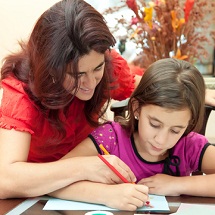Lighting the Fires
- March 1, 2012
- By Elizabeth
 I don’t pretend to have all the answers. In fact, if I’ve learned anything from having four daughters, it’s that I know less about parenting now than I did before my kids were born (didn’t we all?). Being the mother of older children gives me a chance to share my parenting victories at all stages of their development, from infants up through high school seniors preparing to enter college (my daughters are 7, 10, 16, and 18). If you’re reading this, chances are pretty good you’re also a parent who wants to help your children succeed. Not everyone takes an interest in science, but it’s important that some of us do. Even if you don’t work as a scientist yourself, recognizing the value that scientific investigation adds to the quality of all our lives is enough to get your kids over the primary hurdle of taking an interest in it. I can tell you from experience that your desire to support your child in his or her science education is the most important thing you can do as a parent to prepare them for a future career as a scientist.
I don’t pretend to have all the answers. In fact, if I’ve learned anything from having four daughters, it’s that I know less about parenting now than I did before my kids were born (didn’t we all?). Being the mother of older children gives me a chance to share my parenting victories at all stages of their development, from infants up through high school seniors preparing to enter college (my daughters are 7, 10, 16, and 18). If you’re reading this, chances are pretty good you’re also a parent who wants to help your children succeed. Not everyone takes an interest in science, but it’s important that some of us do. Even if you don’t work as a scientist yourself, recognizing the value that scientific investigation adds to the quality of all our lives is enough to get your kids over the primary hurdle of taking an interest in it. I can tell you from experience that your desire to support your child in his or her science education is the most important thing you can do as a parent to prepare them for a future career as a scientist.
Many of us today are eager consumers of science and technology, putting our trust in the discipline of scientific investigation. After all, science has produced life-changing benefits such as the eradication of Small Pox, prosthetic body parts and organs, and the mapping of the entire human genome. We are agog at the incredible findings that are discovered every day and yet most of us seem to be content to sit on the sidelines waiting for the scientists to do all the work while we benefit from the results. Why aren’t more of us participating in the thrill of discovery? There are a lot of misconceptions about what it takes to be a scientist, or what the work of a scientist might be like. It’s quite common for many people to believe they don’t have what it takes to be a scientist, or even understand what kind of work they do. Children themselves often have difficulty defining what a scientist does, let alone aspire to be one. How do you feel about your children forging futures for themselves in meaningful, rewarding careers that really make a difference, rather than settling for whatever comes their way?
It starts by lighting the fires of inspiration at a young age.
In my blog I will be sharing real-world experiences of being a working scientist, not just from my perspective, but from other scientists’ experiences as well. I’m also happy to share my insights into raising children who enjoy science and feel competent enough to tackle challenging academic subjects. Exposure is a critically important part of bringing more budding young scientists on board. Everybody knows what teachers, police officers, and doctors do. Why would anyone choose a future in science if they don’t know what scientists actually do? In addition to meeting real scientists, I’ll be sharing apprentice-like opportunities for kids to start participating in the thrill of discovery while they’re young. I’ll be sharing these opportunities with you, so you can share them with your children.
You don’t have to be Nobel Peace Prize material to have a career in science.
There’s no denying that science is a challenging and demanding field in which to work. It takes a passionate commitment to your goals to wade through the academic rigors and advanced education that are the foundations of a career in science. Start your kids young and help foster their natural curiosity and inquisitiveness and you may see them grow into scientists who discover solutions for global water shortages and famine, or develop alternative energy sources, or find the cure for cancer.